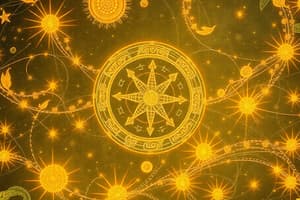Podcast
Questions and Answers
Which thermodynamic process occurs at a constant temperature?
Which thermodynamic process occurs at a constant temperature?
- Adiabatic
- Isothermal (correct)
- Isobaric
- Isovolumetric
What describes the relationship between electric and magnetic fields?
What describes the relationship between electric and magnetic fields?
- Bernoulli's principle
- Newton's laws
- Ohm's law
- Maxwell's equations (correct)
What is the primary focus of modern physics?
What is the primary focus of modern physics?
- Atomic and subatomic phenomena (correct)
- Chemical reactions
- Classical mechanics
- Thermodynamic processes
Which term refers to forces between stationary electric charges?
Which term refers to forces between stationary electric charges?
Which phenomenon is described by general relativity?
Which phenomenon is described by general relativity?
Electromagnetic induction leads to the generation of which of the following?
Electromagnetic induction leads to the generation of which of the following?
Which process describes a system changing with constant pressure?
Which process describes a system changing with constant pressure?
What unifies quantum mechanics with special relativity?
What unifies quantum mechanics with special relativity?
What does Newton's first law state about objects at rest or in motion?
What does Newton's first law state about objects at rest or in motion?
How is acceleration of an object defined according to Newton's second law?
How is acceleration of an object defined according to Newton's second law?
Which of the following best defines kinetic energy?
Which of the following best defines kinetic energy?
What does the law of conservation of momentum state?
What does the law of conservation of momentum state?
What is thermodynamics primarily concerned with?
What is thermodynamics primarily concerned with?
According to the first law of thermodynamics, what does ΔU represent?
According to the first law of thermodynamics, what does ΔU represent?
What does the second law of thermodynamics state regarding entropy?
What does the second law of thermodynamics state regarding entropy?
What is the relationship between heat and temperature?
What is the relationship between heat and temperature?
Flashcards
Classical Mechanics
Classical Mechanics
The study of the motion of macroscopic objects under the influence of forces.
Newton's First Law
Newton's First Law
An object at rest stays at rest and an object in motion stays in motion with the same speed and in the same direction unless acted upon by an unbalanced force.
Newton's Second Law
Newton's Second Law
The acceleration of an object is directly proportional to the net force acting on it and inversely proportional to its mass.
Newton's Third Law
Newton's Third Law
Signup and view all the flashcards
Kinematics
Kinematics
Signup and view all the flashcards
Dynamics
Dynamics
Signup and view all the flashcards
Energy
Energy
Signup and view all the flashcards
Momentum
Momentum
Signup and view all the flashcards
Work
Work
Signup and view all the flashcards
Power
Power
Signup and view all the flashcards
Thermodynamics
Thermodynamics
Signup and view all the flashcards
Temperature
Temperature
Signup and view all the flashcards
Heat
Heat
Signup and view all the flashcards
Internal Energy
Internal Energy
Signup and view all the flashcards
Zeroth Law of Thermodynamics
Zeroth Law of Thermodynamics
Signup and view all the flashcards
First Law of Thermodynamics
First Law of Thermodynamics
Signup and view all the flashcards
Thermodynamic process
Thermodynamic process
Signup and view all the flashcards
Isothermal Process
Isothermal Process
Signup and view all the flashcards
Adiabatic Process
Adiabatic Process
Signup and view all the flashcards
Isobaric Process
Isobaric Process
Signup and view all the flashcards
Isovolumetric Process
Isovolumetric Process
Signup and view all the flashcards
Electromagnetism
Electromagnetism
Signup and view all the flashcards
Electric Field
Electric Field
Signup and view all the flashcards
Magnetic Field
Magnetic Field
Signup and view all the flashcards
Electrostatic Force
Electrostatic Force
Signup and view all the flashcards
Electromagnetic Induction
Electromagnetic Induction
Signup and view all the flashcards
Quantum Mechanics
Quantum Mechanics
Signup and view all the flashcards
Relativity
Relativity
Signup and view all the flashcards
Special Relativity
Special Relativity
Signup and view all the flashcards
General Relativity
General Relativity
Signup and view all the flashcards
Modern Physics
Modern Physics
Signup and view all the flashcards
Study Notes
Classical Mechanics
- Classical mechanics describes the motion of macroscopic objects, including the behavior of particles and bodies under the influence of forces.
- Newton's laws of motion are fundamental to classical mechanics.
- Newton's first law: An object at rest stays at rest and an object in motion stays in motion with the same speed and in the same direction unless acted upon by an unbalanced force.
- Newton's second law: The acceleration of an object is directly proportional to the net force acting on it and inversely proportional to its mass, F = ma.
- Newton's third law: For every action, there is an equal and opposite reaction.
- Concepts in classical mechanics include:
- Kinematics: The description of motion without considering the forces causing it. Includes concepts of displacement, velocity, and acceleration.
- Dynamics: The study of motion and the forces that cause it.
- Energy: The ability to do work. Includes kinetic energy (energy of motion) and potential energy (energy of position). The law of conservation of energy states that energy cannot be created or destroyed, only transformed.
- Momentum: Inertia in motion; it is a vector quantity. The law of conservation of momentum states that the total momentum of a closed system remains constant.
- Work: The transfer of energy by a force acting through a distance, W = Fdcosθ
- Power: The rate at which work is done, P = W/t
- Applications of classical mechanics are numerous, including analyzing planetary motion, designing machines, and predicting trajectories.
Thermodynamics
- Thermodynamics is the study of energy and its transformations.
- Key concepts in thermodynamics include:
- Temperature: A measure of the average kinetic energy of particles in a substance.
- Heat: The transfer of thermal energy between objects due to a temperature difference.
- Internal energy: The total kinetic and potential energy of the particles in a substance.
- Laws of Thermodynamics:
- Zeroth law: If two systems are each in thermal equilibrium with a third system, then they are in thermal equilibrium with each other.
- First law: Energy cannot be created or destroyed, only transformed and transferred.
- ΔU = Q - W. (change in internal energy is equal to heat added minus work done by the system)
- Second law: The total entropy of an isolated system can only increase over time, or remain constant in ideal, reversible processes.
- Third law: The entropy of a perfect crystal at absolute zero is zero.
- Thermodynamic processes, like isothermal, adiabatic, isobaric, and isovolumetric processes, describe how systems change under specific conditions.
- Applications of thermodynamics include power generation (e.g., engines and refrigerators), material science, and chemical reactions.
Electromagnetism
- Electromagnetism is the study of electric and magnetic fields and their interactions.
- Electric charges exert forces on each other.
- Electric fields are created by electric charges and exert forces on other charges.
- Magnetic fields are created by moving electric charges, and exert forces on moving charges.
- Key concepts include:
- Electric fields: A region around a charged object where an electric force exists.
- Magnetic fields: A region around a magnet or a moving charge where a magnetic force exists.
- Electrostatic forces: Forces between stationary charges.
- Electromagnetic induction: The process of generating a voltage (or current) across a conductor by changing the magnetic field around it.
- Maxwell's equations describe the relationship between electric and magnetic fields and their sources.
- Applications of electromagnetism are countless, including electricity generation and power transmission, radio and television communication, and many types of sensors.
Modern Physics
- Modern physics deals with phenomena at the atomic and subatomic levels.
- Important concepts in modern physics include:
- Quantum mechanics: Describes the behavior of matter and energy at the atomic and subatomic levels. It is characterized by quantization and probabilistic behavior.
- Relativity: Describes the relationship between space and time, and their interrelation with gravity.
- Special relativity: Deals with objects moving at constant velocities and the constancy of the speed of light.
- General relativity: Describes gravity as a curvature of spacetime.
- Particle physics: The study of fundamental particles and their interactions.
- Quantum field theory: A theoretical framework that combines quantum mechanics with special relativity.
- Modern physics has led to significant advancements in numerous fields, including the development of nuclear energy, transistors, lasers, and medical imaging technologies.
Studying That Suits You
Use AI to generate personalized quizzes and flashcards to suit your learning preferences.




